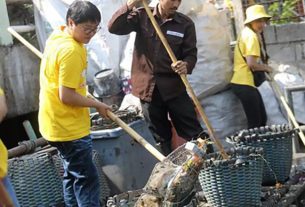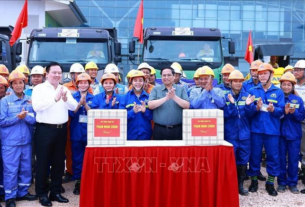Two of Thailand’s leading small-sized power producers Sahacogen (Chonburi) Pcl and Saha Patthana Inter Holding Pcl, have entered into a joint venture to build biomass power plants in Cambodia and Myanmar with a total investment of about $20 million, according to a Singapore-based online business news agency.
DealStreetAsia quoted Viroj Theeravatvatee, managing director of Sahacogen (Chonburi) Pcl, as saying the new power plants would provide the unmet demand for electricity in both countries.
“Electricity supply in Cambodia and Myanmar is insufficient. We plan to invest in Cambodia first. We still have some land leasing issues to sort out in Myanmar. We are also considering a gas-based power plant in Myanmar as another option,” he said.
Tun Lean, director of the General Energy Department at the Kingdom’s Ministry of Mines and Energy told Khmer Times yesterday that his ministry had yet to receive any formal notification from the two Thai companies. He did not elaborate further.
Mr. Viroj said the firm was working on the details of the power purchase agreement with the Cambodian government and hoped to finalize the investment plan by the middle of next year.
The company plans to set up one plant outside Phnom Penh and another near the Thai-Myanmar border. Each project will have a generating capacity of 10 megawatts.
According to DealStreetAsia, the power plant would take around seven to eight years to break even.
Cambodia is striving to get 9,606 villages out of 14,073 villages nationwide into the national electricity grid by the first half of this year. By 2020, the government expects to install electricity lines in all villages in the country.
“By 2020, all villages in the country will be connected to the national grid and there will be electricity lines nationwide,” Ty Norin, chairman of Electricity Authority Cambodia (EAC) told Khmer Times recently.
“Cambodia will have enough electricity to supply the whole country in 2020 and the purchase of power from neighboring countries will be optional,” added Mr. Norin.
About 85 percent of Cambodian people live in rural areas and the country has no indigenous sources of fossil fuel. Over 84 percent of primary energy is created by fuelwood, according to reports. Rechargeable car batteries are normally used in rural areas for basic lighting and powering radios and small television sets.
Mr. Norin pointed out that Cambodia had a total of seven hydropower plants in operation and another two – the Lower Se San 2 and a coal-fired power plant in Sihanoukville – are under construction. The coal-fired Sihanoukville power plant will be completed next year, he said.
The EAC chairman said electricity rates would be lower when the Lower Se San 2 and the Sihanoukville coal-fired power plant are in full operation.
Presently, the price per kilowatt hour (kWh) on the national grid is 800 riel (20 cents) but the government charges only 480 riel (12 cents) per kWh for those households using less than 10 kWh a month. The price of 480 riel per kWh is also for rice farmers using electricity to operate their water pumps for irrigation.


